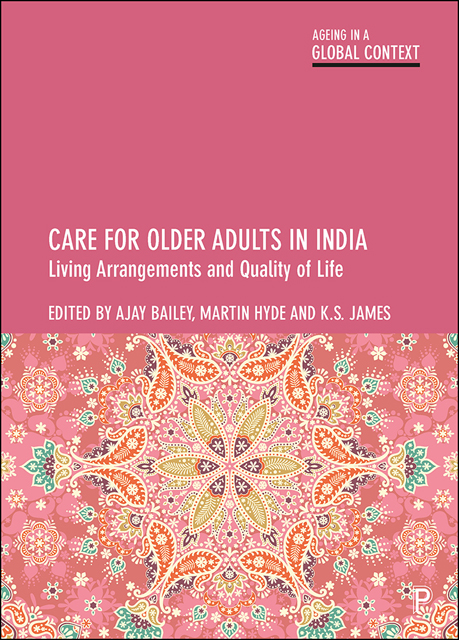Book contents
- Frontmatter
- Contents
- List of figures and tables
- Notes on the editors
- List of contributors
- Acknowledgements
- Series editors’ preface
- Map of India
- 1 Introduction: Living arrangements and care in India
- 2 Theorising care and relationships in the age of migration
- 3 Emerging living arrangements of older adults in India: patterns and welfare implications
- 4 Living arrangement concordance and the well-being of older persons in India
- 5 Family size and living arrangements among older adults in Kerala: panel data analysis, 2004– 19
- 6 Care arrangements for older adults: exploring the intergenerational contract in emigrant households of Goa, India
- 7 All my responsibilities towards my children are over! Linked lives and life course obligations among older adults with migrant children in India
- 8 Interpreting the landscapes of care for older men in Delhi and Kolkata: perspectives from care receivers and caregivers
- 9 The role of cultural meaning system and place attachment in retaining home ownership while residing in retirement homes in Kerala, India
- 10 Decision-making and choice or sine qua non? Care home entry in Tamil Nadu
- 11 Welfare and development programmes for older adults in India
- 12 Lessons and future directions for caregiving research in India
- Index
12 - Lessons and future directions for caregiving research in India
Published online by Cambridge University Press: 13 October 2022
- Frontmatter
- Contents
- List of figures and tables
- Notes on the editors
- List of contributors
- Acknowledgements
- Series editors’ preface
- Map of India
- 1 Introduction: Living arrangements and care in India
- 2 Theorising care and relationships in the age of migration
- 3 Emerging living arrangements of older adults in India: patterns and welfare implications
- 4 Living arrangement concordance and the well-being of older persons in India
- 5 Family size and living arrangements among older adults in Kerala: panel data analysis, 2004– 19
- 6 Care arrangements for older adults: exploring the intergenerational contract in emigrant households of Goa, India
- 7 All my responsibilities towards my children are over! Linked lives and life course obligations among older adults with migrant children in India
- 8 Interpreting the landscapes of care for older men in Delhi and Kolkata: perspectives from care receivers and caregivers
- 9 The role of cultural meaning system and place attachment in retaining home ownership while residing in retirement homes in Kerala, India
- 10 Decision-making and choice or sine qua non? Care home entry in Tamil Nadu
- 11 Welfare and development programmes for older adults in India
- 12 Lessons and future directions for caregiving research in India
- Index
Summary
Introduction
When discussing this book with colleagues and students, people were generally excited by it and said that there was a real need for such a book. Almost everyone, particularly those in the UK, had a fairly similar argument for why this was important which went something like this: i) the family has traditionally been the main source of care for older adults in India, ii) tradition mandates that daughters-in-law will move in to the family home with their husband and assume caring responsibilities (for all generations), iii) modernisation and migration are destabilising these traditional living arrangements as adult children, in particular women, move for education and/or work, iv) in the absence of any old age social security programs older adults will be unable to get the care that they need and instead face years of disability, depression and loneliness. There is definitely more than a kernel of truth in this accepted narrative about changing living arrangements and care for older adults in India. Families are mandated to take care of their older members through the Maintenance and Welfare of Parents and Senior Citizens Act of 2007. This act empowers any ‘senior citizen including parent who is unable to maintain himself [sic] from his [sic] own earning or out of the property owned by him [sic]’ to apply for support from their relatives who are then obligated ‘to maintain a senior citizen … so that [they] may lead a normal life’. Failure to do so can result in fines or imprisonment. This Act is often taken to underscore the centrality of the family in India and seen to represent the government's attempt to shore it up in the face of challenges such as migration and modernisation. Again, such concerns are not without merit. As has been noted earlier in the book the scale of internal and international migration in India is staggering. There are estimated to be 450 million internal migrants within India and a further 18 million Indians who live abroad (De, 2019; UNDESA, 2020). Alongside this, as the data presented by James and Kumar (Chapter 3) and Rajan and Sunitha (Chapter 5) show, around a fifth of older adults do not live in households with extended families. For many older Indians this represents the decline of traditional values and is something to be lamented.
- Type
- Chapter
- Information
- Care for Older Adults in IndiaLiving Arrangements and Quality of Life, pp. 227 - 238Publisher: Bristol University PressPrint publication year: 2022



